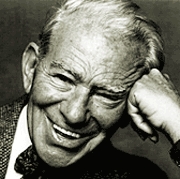On this date in 1896, lyricist and social justice poet Edgar Yipsel (Yip) Harburg, known as “Broadway’s social conscience,” was born of Russian-Jewish immigrant parents. Raised in poverty on Manhattan’s Lower East Side, he later attended City College of New York, and struck up a lifelong friendship with classmate Ira Gershwin. Harburg began writing lyrics for Broadway revues in the 1930s, including the classic anthem of the depression, “Brother, Can You Spare a Dime?” (with composer Jay Gorney, 1932) and “April in Paris” (with Vernon Duke, 1932).
Harburg conceived and wrote lyrics for book musicals with political and social themes, including “Hooray for What!” (1937, with an anti-war theme, music by Harold Arlen) and “Bloomer Girl” (1944, feminist, anti-racist theme, music by Arlen). He co-wrote the book (with Fred Saidy) and wrote the lyrics for “Finian’s Rainbow” (1947, music by Burton Lane), which, despite its slyly subversive message, won the Henderson and George Jean Nathan Awards for Best Musical Comedy.
He called himself a “rebel by birth.” “The House of God never had much appeal for me. Anyhow, I found a substitute temple — the theatre,” Harburg said in Who Put the Rainbow in the Wizard of Oz? (1993). His most famous Hollywood work was in “The Wizard of Oz” (1939, music by Arlen) with his Academy Award-winning song, “Over the Rainbow.” In 1962 he and Arlen scored the animated feature “Gay Purr-ee” (featuring the voice of Judy Garland).
From 1951 to 1961 during the House Un-American Activities Committee investigations and the McCarthy hearings, Harburg was “blacklisted” for his political views from film, television and radio but kept working on Broadway. He wrote the lyrics to over 600 songs with a variety of composers, including: “It’s Only a Paper Moon” (1932, with Arlen), and “Happiness Is Just a Thing Called Joe” (1943, Arlen, from the film “Cabin in the Sky”). With Lane, he wrote “Old Devil Moon” and “How Are Things in Glocca Morra?” The team of Arlen and Harburg also wrote Groucho Marx’s signature song, “Lydia, the Tattooed Lady” (1939, from “At the Circus”).
His volume of satiric light verse, Rhymes for the Irreverent (1965), was reissued in 1999. A second volume, At This Point in Rhyme (1976) was reissued in 2000 under the title More Rhymes for the Irreverent. He died at age 84. For more detail, see Dan Barker’s excellent long essay “The Theater Was His Temple.” (D. 1981)


